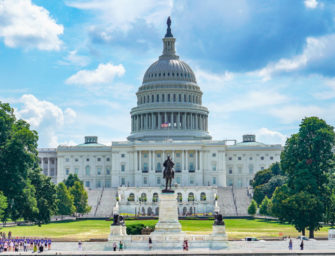AGU Applauds the Fourth National Climate Assessment
In 1990, President Ronald Reagan initiated the U.S. Global Change Research Program, and Congress mandated that a report be released at least every four years outlining what climate change – past, present, and future – means for the United States. In the decades since, four of the National Climate Assessments have been released and AGU members have played a role in each one as authors and as contributors of their science.
The report released today – the Fourth National Climate Assessment Volume II: Impacts, Risks, and Adaptation in the United States (NCA4 Vol. II) builds on the 2017 Climate Science Special Report (NCA4 Vol. I) by assessing the major impacts and vulnerabilities climate change poses to different sectors and regions in the United States. The findings are ever more concerning, and increasingly global in their implications.
As we near the end of 2018, we are all reflecting on the natural disasters the world has experienced this year and the thousands of lives that have been lost or impacted as a result. From devastating hurricanes and floods, to scorching heat waves, to the most recent wildfires–many of these kinds of extreme events are fueled or altered by a changing climate.
The report distills information from ten regions of the United States to examine new threats our communities face from climate change. It finds that our changing climate will exacerbate existing vulnerabilities, challenging or undermining efforts to protect human health and safety, quality of life, and the rate of economic growth. Whether you are a farmer in the Southwest who just lost their harvest from a drought, or an Alaskan native whose village is threated by declining permafrost, the report finds you at risk from climate change.
This latest NCA Volume also demonstrates how Earth and space science can inform the public and generate strong societal responses. We hope that our community will play an active role to address these impacts and help to create a more resilient future.
AGU is committed to leading on climate science by:
- Updating our Climate Change Position Statement in 2019, which will involve the formation of an expert panel to do the rewrite. To nominate someone to serve on the panel, email [email protected] with the subject line “Climate Change Position Statement”).
- Continuing to support the rapid exchange and dissemination of climate science research through our journals and meetings, as well as outreach.
- Fostering projects in more than 70 communities to facilitate community-science partnerships that inform adaptation strategies and reduce vulnerabilities through the Thriving Earth Exchange
- Renovating AGU’s new net-zero Headquarters to serve as a living testament to our own commitment to sustainability.
In just over two weeks, we invite you to come together with thousands of your colleagues from across the Earth and space community in Washington, DC for our Fall Meeting. Together we will show what science stands for.
As part of our Fall Meeting Program, two sessions highlight the findings of the Fourth National Climate Assessment. We hope to see you there.
Sessions:
- Union Session 24A: Highlights from the Fourth National Climate Assessment: Impacts, Risks, and Adaptation in the United States
Tuesday, 11 December 2018 from 4:00 – 6:00 p.m.
(video of this session will be presented on Facebook Live)
Walter E Washington Convention Center – 202A - Poster Session PA31D: The Fourth National Climate Assessment: Highlighting Impacts, Risks, and Responses Across Sectors and Regions of the United States Posters
A unique experience to walk through the full report where each chapter will have a poster and authors on hand to answer questions
Wednesday, 12 December 2018 from 08:00 a.m. – 12:20 p.m.
Walter E Washington Convention Center – Hall A-C (Poster Hall)
As ever, AGU remains committed to our mission of promoting the discovery of Earth and space science for the benefit of humanity, on climate change and many other fields. We are excited to work with all of you to leverage the research to make a difference for our communities – in the U.S. and globally.
Also see AGU’s Media Advisory and Eos article, “What Specific Costs and Risks Do We Face From Climate Change”




There are no comments
Add yours